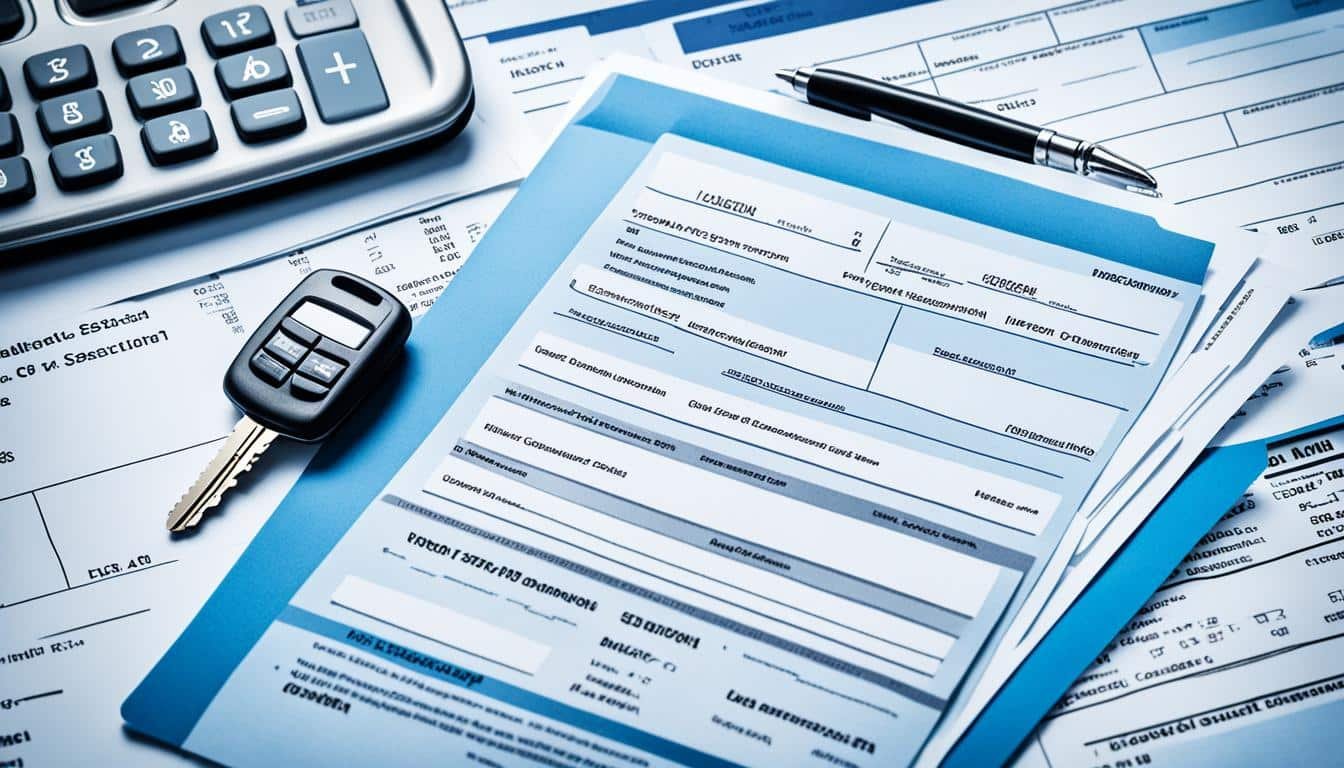Getting a car loan is an important step when you’re buying a car. Having the right documents ready makes things easier. Lenders want to know you’re reliable and can pay back the loan. You will need to show things like your name, how much you earn, your credit history, where you live, and information on the car you’re buying.
It’s smart to know what documents you need for a car loan. These needs are similar whether you’re after a new or used car, or your loan is secured or not. This info is key for the lender to see if you qualify for the loan and the kind of deal they can give you.
Key Takeaways
- Lenders typically require proof of identity, income, credit history, and residence to assess an applicant’s creditworthiness and ability to repay a car loan.
- The specific documents needed may vary depending on the type of car loan (new, used, secured, or unsecured) and the lender’s policies.
- Gathering the necessary documentation before applying for a car loan can help streamline the application process and increase the chances of getting approved.
- Providing complete and accurate information on the loan application is crucial, as lenders will use this data to determine the loan terms, including the interest rate and monthly payments.
- Carefully reading and understanding the loan agreement before signing is important, as it is a legally binding contract.
Proof of Identity
When you want a car loan, lenders need to check who you are. This step is super important. It stops terrorism and money laundering. You can use your driver’s license, passport, or other government photo ID.
Driver’s License
Your driver’s license is the main way lenders make sure you’re you. It shows your name and address. Plus, it proves you can drive legally, which is key for getting a car loan.
Passport
If you can’t use a driver’s license, a passport works, too. It has your name, photo, and personal info for checking your identity. It’s another good choice for proof.
Government-Issued Photo ID
Some places also accept a government photo ID, like a state ID or military ID. It has the same important details as a driver’s license or passport. This ID can be okay for verifying who you are when applying for a car loan.
Whichever ID you use, lenders will check it closely. They must make sure you’re eligible for the car loan. The right ID helps speed up the process.
Proof of Income
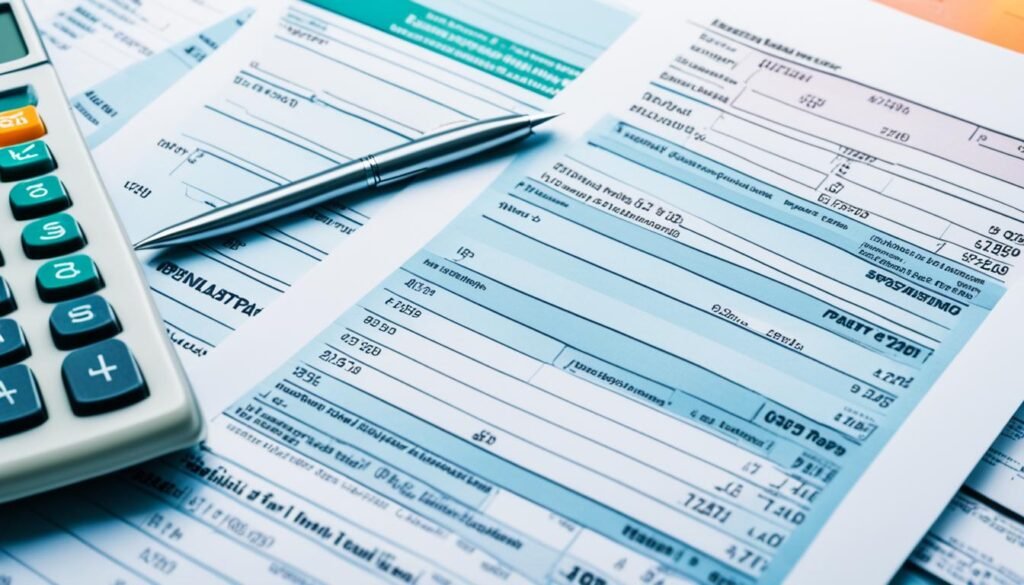
Lenders look at your job, what you own, how good your credit is, and your bills. They want to make sure you can pay back the car loan each month. It’s smart to show them your latest pay stubs. This helps in the car loan application process and meeting the car loan eligibility criteria.
You can also show other ways you make money, like tax forms or your W-2. Sometimes, the lender will call your job just to check that you work there and how much you make.
It also helps to prove any extra money you get, like rent from a property, or support from your ex-spouse or the government. This might let you borrow more money or get better car loan interest rates and car loan payment terms. Make sure to bring any proofs of this extra income when you apply for the loan’s down payment.
Credit and Financial History
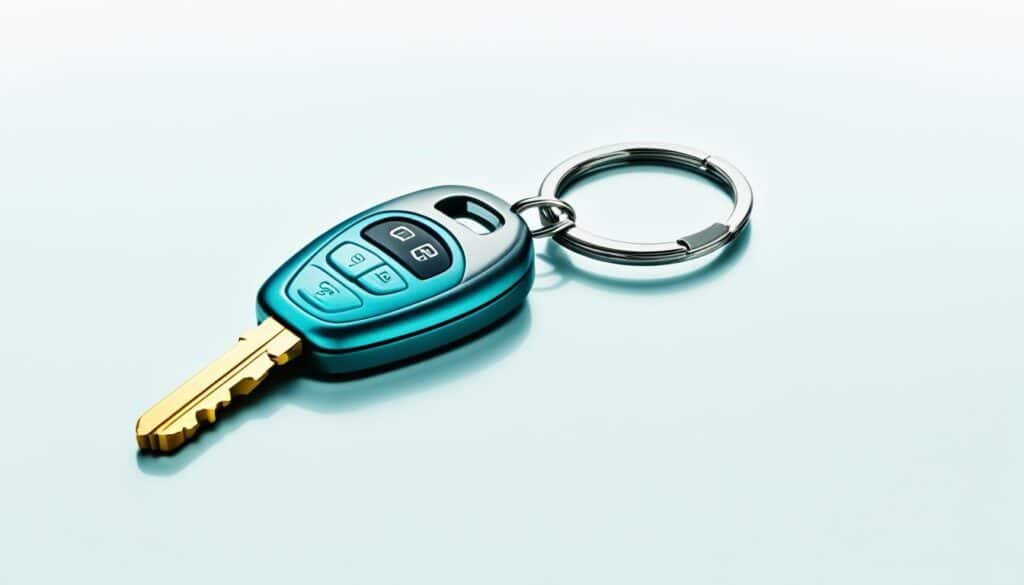
When you apply for a car loan, you’ll give the lender your Social Security number. They also need your name, address, and date of birth to check your credit report. Every lender has unique rules, so there’s no set credit score you must have for a car loan.
Lenders use things like the FICO Auto Score or VantageScore to see if you’re a good risk.
Social Security Number
Your Social Security number is key. It lets the lender look into your credit history and finances. This helps with your car loan eligibility and zeroes in on the interest rates and fees suitable for you.
Credit Report
Your credit report shows your financial past. It lists your bankruptcies, foreclosures, and other money troubles. Lenders study this to decide if they should approve your car loan.
Unpaid debts, especially from earlier auto loans, could hurt your chances. This might make them worry you won’t repay them.
Debt-to-Income Ratio
Your debt-to-income ratio (DTI) is also looked at. It’s your debts compared to your income. A high DTI could make lenders think twice. It may mean you’re already too deep in debt. This could affect the car loan eligibility criteria and terms you’re given.
Knowing how important your credit and financial background is helps. You can work to boost your credit score and look better to lenders. This might lead to better car loan repayment options.
Proof of Residence
Lenders need to know where you live and see proof of it. If your driver’s license or the address on your credit application matches your report, you’re good for most car loan applications. But if you just moved, you might need more.
Utility Bills
Recent utility bills like for electricity or water work to show you live where you say. They meet the car loan criteria that lenders ask for.
Mortgage or Lease Statements
If you own or rent, your mortgage or lease can prove your address. These show where you live for the car loan documents.
Bank or Credit Card Statements
Bank statements or credit card bills from the last month help prove your home. They’re good for the car loan process too.
A P.O. box doesn’t count as a home address. Getting these proofs ready early makes getting a car loan easier. It helps the whole car buying process go smoothly.
Vehicle Information
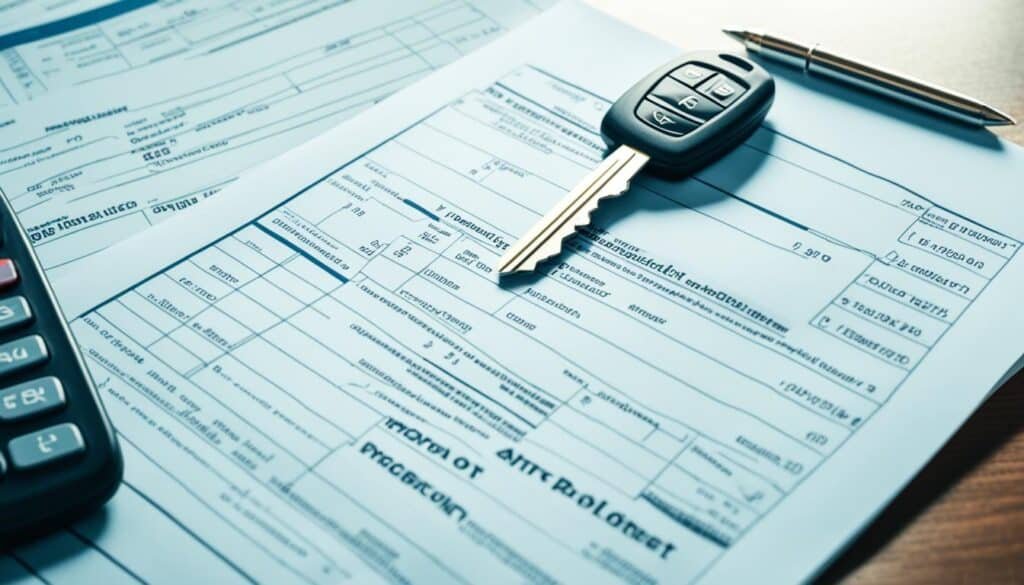
When you want a car loan, you have to give a lot of details about the car you want. This could be a bill of sale, the VIN, and the car’s make and year.
Bill of Sale or Purchase Agreement
If you’re getting a loan from a car dealer, they usually handle sharing the car’s info. But, if the loan comes straight from a lender, or you’re buying from someone privately, you need important papers. These include the sale price, the car’s VIN, and its make and year.
Vehicle Identification Number (VIN)
Every car has a VIN, which is like its fingerprint. It’s crucial for the lender to make sure the car is clear of any debts or issues.
Year, Make, and Model
The car’s year, make, and model are key. They help lenders figure out the car’s value. This decides if you can get a loan and the loan’s terms.
Car Loan
Car loans come in many shapes to fit different needs. There are new car loans and used car loans, each with their own benefits and restraints. Your ability to get a loan is influenced by factors like your credit, your income, and the car itself.
New Car Loans
New car loans are for those wanting a brand-new ride. They often have lower interest rates because the car itself acts as security for the loan. This lets you drive away in a shiny, new car sooner.
Used Car Loans
Used car loans are for buying cars that aren’t brand new. These may be older models or ones that someone else has already driven. They can be more budget-friendly and make it easier to find a specific car no longer in production.
Secured Car Loans
Secured car loans are linked to the car you’re buying. The car is the guarantee for the loan, which can mean lower interest rates. If you fail to pay, the lender can take the car back.
Unsecured Car Loans
Unsecured car loans don’t need a specific car as collateral. They rely more on your credit score and come with higher interest rates. These can be a good route for those with less credit or who don’t want to risk their car.
Whichever car loan type you go with, make sure you think it through. Look at your finances, the car you want, and the loan’s details. This will help make sure buying your car is a smooth and happy process.
Proof of Insurance
Before driving your new car home, you must show proof of insurance. You usually provide an insurance declarations page. It shows important parts of your policy, like your policy number and coverage limits . The lender might ask for specific coverage levels. They may need you to have a certain maximum deductible or minimum liability limits. Make sure to check these requirements with your insurance company.
If you already have auto insurance, your new car could be covered for about 30 days. During this time, you can work on the loan paperwork while covered by your existing policy. Yet, you should still tell your insurance company about your new car, and if your coverage needs change, update them too.
Meeting your car loan’s insurance rules is very important. Lenders often won’t give you the car’s title without proof of enough insurance. Having all your insurance info ready can make buying a car easier. It helps smoothly start off with your new vehicle.
Down Payment
When you are ready to pay a car loan down payment, you have a few options. You can use cash, a cashier’s check, or a certified check. If you choose to use a credit or debit card, check with the dealer first. Make sure they support card payments for down payments and ask about fees or limits. It’s also a good idea to check your card’s limit for a single purchase.
Cash
Using cash for your car loan down payment is simple. It allows you to pay a big part of your vehicle’s cost at once.
Cashier’s Check
A cashier’s check is a favorite for a car loan down payment. The dealer knows the money is there since it’s bank certified.
Certified Check
A certified check works similarly to a cashier’s check. It assures the dealer that the money is secure for your car loan down payment.
| Down Payment Option | Advantages | Disadvantages |
|---|---|---|
| Cash | – Straightforward payment method – No additional fees |
– Must have sufficient cash on hand |
| Cashier’s Check | – Funds are guaranteed – Secure payment method |
– May require a fee from the issuing bank |
| Certified Check | – Funds are guaranteed – Secure payment method |
– May require a fee from the issuing bank |
Choosing the best car loan down payment is crucial. You must have enough funds ready. Also, make sure to talk to the dealer and your lender about any specific rules or limits.
Trade-In Documentation
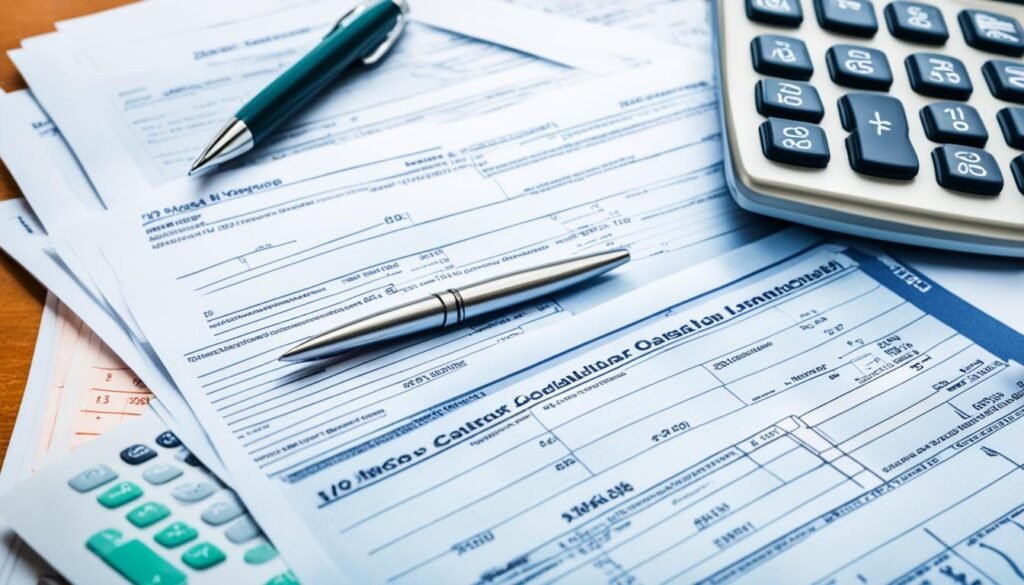
Ready to trade in your car for a new one or as part of getting a car loan? You’ll need some important documents. These are your car’s registration and title. They show you own the car and if there are any loans on it.
Vehicle Registration
Your car’s registration proves you own it. It shows details like its make, model, year, and the VIN. It also has your name. Having this can speed up your trade-in process for a new driver’s car, a student’s car, a professional’s car, a retiree’s car, a high-value or low-value car.
Vehicle Title
The vehicle title is also vital for a trade-in. It says who legally owns the car and if there are any loans on it. With the title, you show you can sell the car. It also proves you’ve paid any debts. This makes getting a car loan easier.
Loan Payoff Information
Got a loan still on your car? You need to share the lender’s details and your loan payoff figure. This lets the dealer or lender clear the car’s debt. Then they can transfer the title. Getting these details early makes everything smoother.
Eligibility Documentation
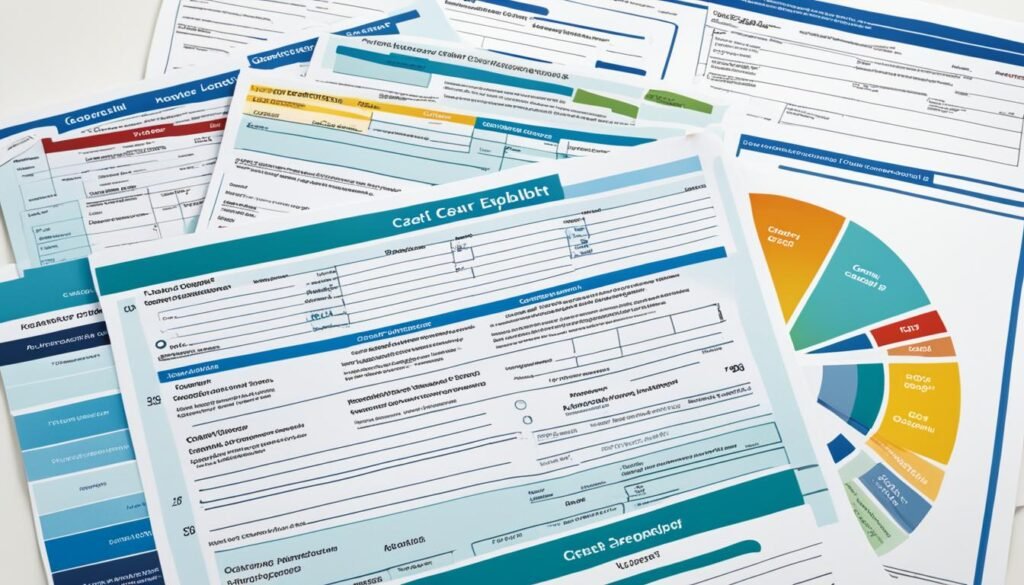
If a dealer gives you discounts like for military or students, ask what proof you need. Showing the right documents can get you better car loan deals. This way, you can save more on your car.
Military Discount Proof
Service members and veterans might get special car loan discounts. For these deals, you often must show your military ID, discharge papers, or a letter from a superior.
Student or Recent Graduate Proof
Students or new grads can find car loans with better rates. Have your student ID, transcript, or diploma ready. This shows you’re eligible for these special deals.
Bring the documents you need to show you qualify for any discounts or financing. This can help you get the best car loan terms. You could save a lot on your new car.
Application Process
When filling out your auto loan application, ensure all details are complete. Include every source of income you have. This is crucial for the loan process. Also, make sure your down payment comes from your own funds. Lenders prefer this. Think about any extras you might want for your car.
Read Loan Agreement Carefully
Before you sign, read the auto loan agreement thoroughly. It is a legal paper. Look at the interest rates, fees, payment terms, and how you will pay back the loan. Make sure you get it all.
Keep Copies of Documents
Always keep a copy of your loan documents in a safe spot. This is good for keeping up with your loan and for any future needs. Having these papers can help with your loan’s pre-approval or prequalification later on.
Also Read: Building Dreams: The Power Of Small Business Loan
Conclusion
Getting a car loan can be tricky, but getting ready and having the right documents in hand makes it easier. The car loan market follows strict rules, and acting ethically is key. Keeping up with the latest trends, avoiding scams, and understanding what borrowers face today gives you the upper hand.
The world of car loans is always changing. Technology is advancing, and people’s tastes are too. Despite this, the basics of applying for a car loan – showing who you are, your income, credit score, and info about the car – are not likely to change much. Knowing what lenders will ask for and getting those documents ready early on can help you get the perfect car loan for you and your budget.
Getting a car loan is a big part of buying a vehicle. Knowing the rules, acting responsibly, and being prepared for any challenges is important. Doing this will help you get the car loan you need and drive away in your new or used car. No matter who you are, preparing well and being careful will guide you smoothly through the car loan process.
FAQs
What documents are required for a car loan application?
To apply for a car loan, you need several documents. These include proof of who you are and your income. You also need to show your credit history, where you live, details about the car, and insurance.
What types of proof of identity are required?
Lenders need to confirm your identity. They do this with a photo ID, like a driver’s license, passport, or another official ID.
What income documentation is needed for a car loan?
To prove your income, lenders might ask for pay stubs or tax returns. They also check your bank statements and W-2 forms.
How does my credit history affect a car loan?
Your credit history is very important for a car loan. Lenders look at your credit score and report. They also consider how much you owe versus how much you earn.
What proof of residence is required for a car loan?
For where you live, lenders usually ask for recent bills or statements. These can be for utilities, rent, or mortgages. They can also be bank or credit card statements.
What vehicle information is needed for a car loan?
If a dealer is involved, they provide the car’s details. But if you buy from a person, you need more info. You should have a bill of sale and the car’s VIN, year, make, and model.
What types of car loans are available?
There are many kinds of car loans. You can get a loan for a new or used car. These loans might need something as security. Or they might be simple, without security needed.
What proof of insurance is needed for a car loan?
You need to show you have car insurance. Lenders often want to see an insurance declarations page before you can take the car.
How do I make a down payment on a car loan?
You can pay your down payment with cash or a check. This check should be from a bank or be certified.
What documentation is needed if I’m trading in a vehicle?
If you trade in your old car, you must provide the title and registration. You might also need to show the car’s mileage or that it passed a smog check.
What additional documentation may be required for special financing options?
For special deals like discounts or special loans, you have to show you qualify. This could mean showing you are in the military or recent graduate programs.
What should I do when completing the car loan application?
When filling out the loan application, double-check the info you give. Include all your income sources. Don’t try to sneak in money from somewhere else for your down payment. It’s also very important to read and understand the loan terms. Keep copies of all documents for your records.
